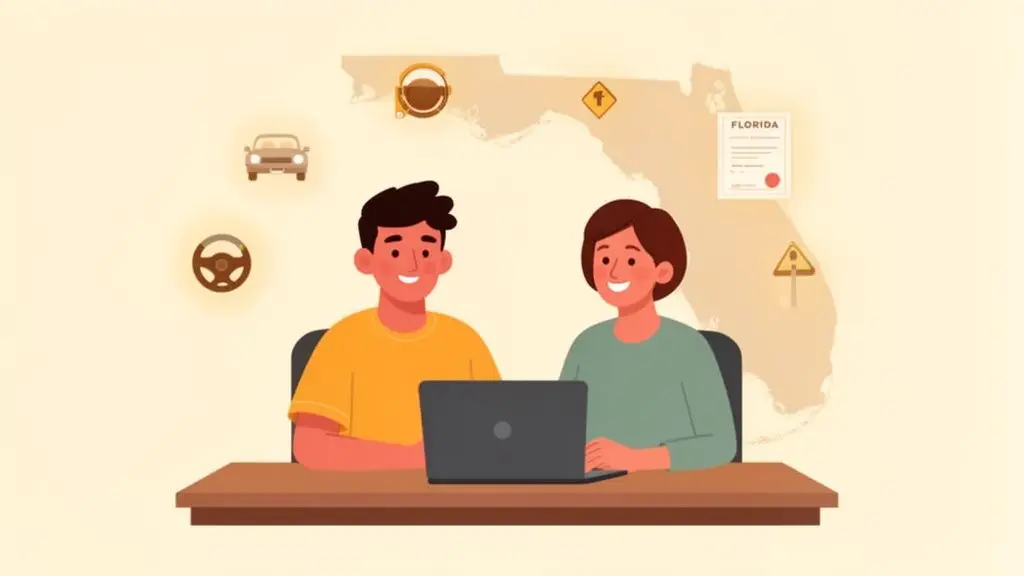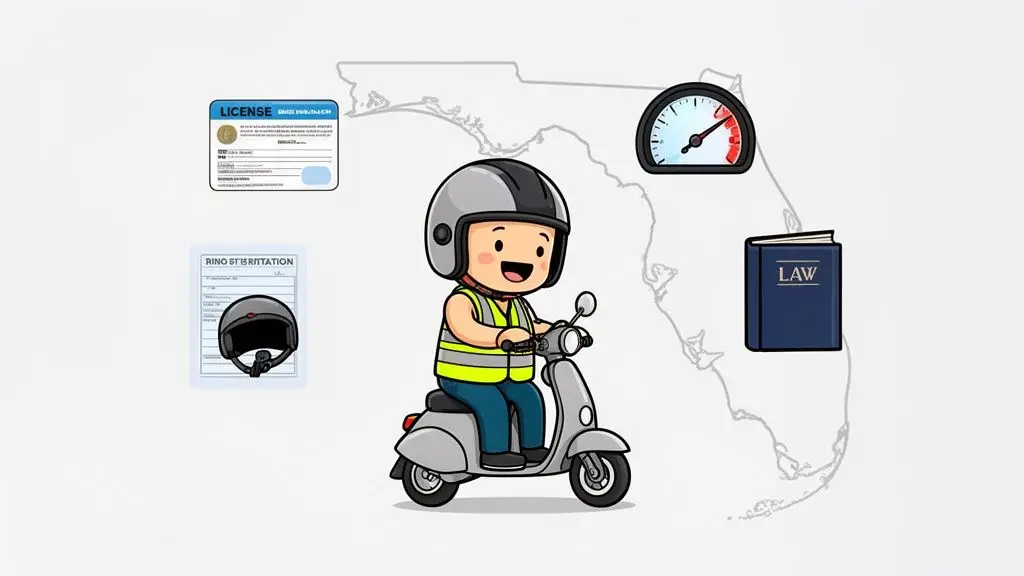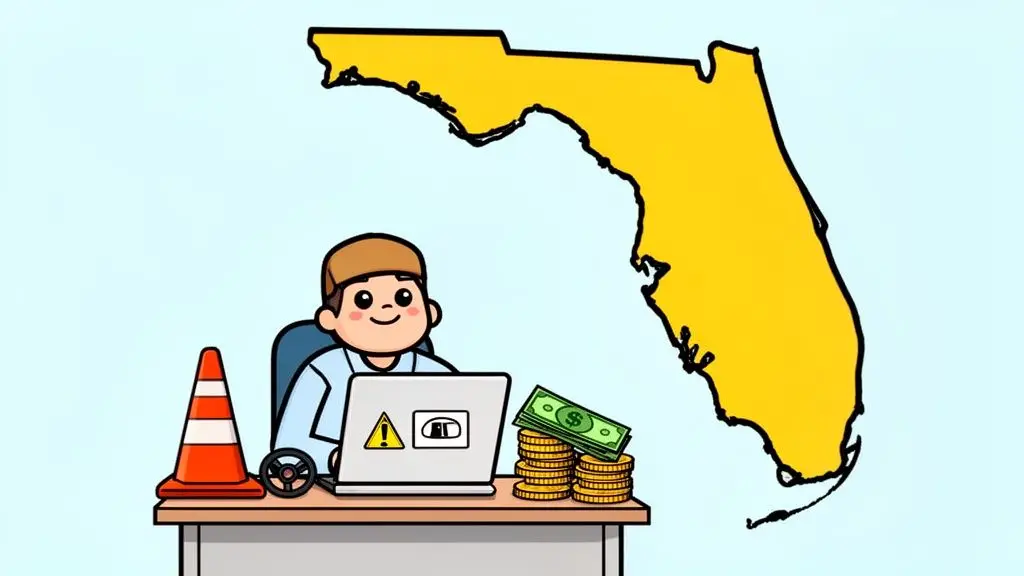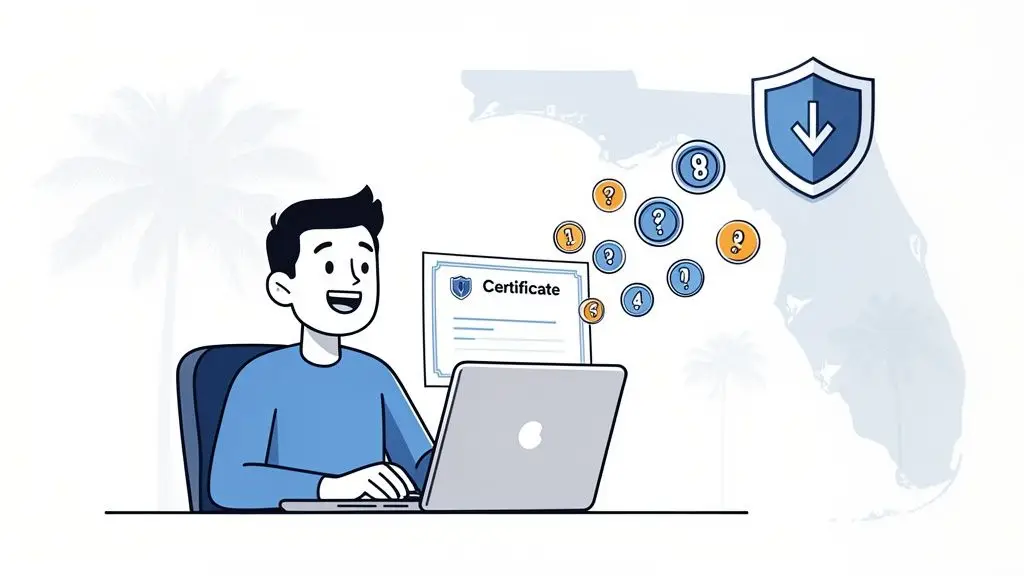Got that sinking feeling after getting a traffic ticket? We’ve all been there. Wondering what it did to your driving record is a common worry, but thankfully, checking your points in Florida is pretty straightforward.
You can either do a quick, informal check through the FLHSMV online portal or, if you need it for official reasons, order a certified copy of your driving record. Let’s walk through how it all works so you can get a clear picture of where you stand.
A Florida Driver’s Guide to License Points

Here in Florida, the points system isn’t something to take lightly. A few missteps can add up fast, leading to bigger insurance bills or, even worse, a suspended license. Keeping an eye on your driving record is just part of being a smart, responsible driver.
This guide will demystify the process. We’ll show you exactly how to use the official tools from the Florida Highway Safety and Motor Vehicles (FLHSMV) department to see your record. Whether you need a quick glance online or a formal document for a new job, you’ll know what to do.
Why Checking Your Points Matters
Knowing your point total isn’t just for curiosity’s sake—it’s about staying ahead of potential problems. Being proactive can save you a world of headaches.
- Avoid a Surprise Suspension: Racking up too many points within a certain period means an automatic license suspension. It’s crucial to know the thresholds and understand how many points to get your license suspended.
- Keep Insurance Costs Down: More points almost always mean higher insurance premiums. Insurance companies see you as a bigger risk, and they’ll adjust your rates accordingly.
- Protect Your Job: Many jobs, especially those involving driving, require a clean record. Employers frequently check this before making a hire and sometimes run periodic checks on current employees.
It’s also a good idea to understand all the situations that can lead to points, including the necessary steps and paperwork involved. For instance, knowing about things like document notarization after car accidents helps you handle tough situations correctly and protect your driving privileges from the start.
Get an Instant Look with the FLHSMV Online Portal
If you need a quick answer about the points on your license, the fastest route is the official Florida Highway Safety and Motor Vehicles (FLHSMV) online portal. This gives you an immediate, unofficial look at your driving history, perfect for a personal check-in.
All you need to get started is your Florida driver’s license number. Within minutes, you can have a clear picture of your record, which is incredibly handy if you just got a ticket or need to check your status before getting a new insurance quote.
Choosing the Right Report for You
When you get to the FLHSMV website, you’ll see a couple of options for your record. The most common choices are the 3-year and 7-year driving records.
For most personal situations, like checking for insurance purposes, the 3-year record is all you’ll need. However, if you’re applying for a job that involves driving—especially a commercial driving position—your potential employer will likely ask for the more detailed 7-year history.
Pro Tip: Before you click “buy,” think about why you need the record. If it’s for something official like a court appearance, you’ll probably need a certified copy, not the instant online one.
Curious where to start? Here’s a look at the official FLHSMV homepage.
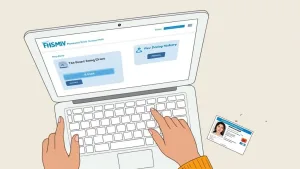
From here, you’ll look for the “Driver License & ID Cards” section to kick off the process. Keeping an eye on your points is a smart first step, but it’s also a good idea to know how to check for a suspended license, which you can often do through the same state portal.
How to Order Your Official Florida Driving Record
The online check is fantastic for a quick look, but there are times when you need something more official. Let’s say you’re heading to court, applying for a job that involves driving, or dealing with an insurance company—that quick printout from the portal just won’t cut it. In these cases, you’ll need a certified copy of your Florida driving record.
Getting your hands on this official document involves going straight to the source: the FLHSMV. You’ve got a few different ways to tackle this, each with its own cost and timeline. The best choice really boils down to how urgently you need it.
Comparing Your Options
You can either order it online, stop by a service center in person, or mail in a request. The price is pretty much the same regardless, but the speed at which you get the document can be wildly different.
- Go In-Person: This is your fastest option, hands down. If you visit a driver license service center or tax collector’s office that offers licensing services, you can usually walk out with your certified record that same day.
- Order Online: The FLHSMV website lets you order a certified copy directly, which they’ll then mail to your address on file. It’s convenient if you aren’t in a huge rush.
- Request by Mail: Definitely the slowest route. You’ll need to print a form, fill it out, and send it in with your payment. Then, you wait for them to process it and mail it back.
My advice? If a deadline is breathing down your neck, go in person. It’s the only way to guarantee you’ll have it immediately. If you have a week or so to spare, ordering online saves you a trip and is perfectly reliable.
Knowing the ins and outs of your record is crucial. For a complete overview of all the methods available, our guide on how to check your driving record in Florida covers every detail to make sure you’re prepared for any situation. Having the right document in hand when you need it makes all the difference.
Making Sense of Your Driving Record
So you’ve got your Florida driving record in hand. At first, it might just look like a wall of text filled with official-looking codes and dates. But once you know what you’re looking for, it tells a clear story about your time on the road. Each line item will show the specific violation, the date you were convicted, and—most importantly—the points that were added to your license.
This isn’t just about satisfying your curiosity. This document is the single source of truth for your driving history, and it directly influences everything from your insurance premiums to your legal ability to drive.
The infographic below breaks down the costs for getting your hands on this official record.
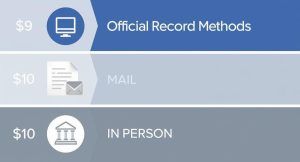
As you can see, the price is pretty much the same whether you get it online, by mail, or in person. The real difference comes down to what’s most convenient for you.
Decoding Florida’s Point System
Florida uses a straightforward system: the more serious the traffic violation, the more points you get. Think of it as a tally against your license. A minor speeding ticket (less than 15 mph over the limit) will typically land you 3 points, but a more severe mistake like leaving the scene of an accident could slap 6 points on your record.
The goal is to flag risky driving habits before they become a major problem. It’s a common approach to road safety used worldwide. For example, some countries use a “demerit” system where you start with a clean slate and lose points for violations. You can read more about these global penalty point systems on Wikipedia).
No matter the specifics, the message is universal: points are a warning sign.
Your driving record tells a story that insurance companies and the FLHSMV are reading closely. Each point is a chapter they pay attention to, directly affecting your premiums and your ability to legally drive.
To give you a better idea of what to look for on your record, here’s a breakdown of some common violations and the points they carry in Florida.
Common Florida Traffic Violations and Their Point Values
| Violation | Points Assigned | How Long Points Last |
|---|---|---|
| Speeding (15 mph or less over limit) | 3 points | 36 months |
| Speeding (16 mph or more over limit) | 4 points | 36 months |
| Speeding resulting in a crash | 6 points | 36 months |
| Running a red light | 4 points | 36 months |
| Leaving the scene of a crash (damage > $50) | 6 points | 36 months |
| Reckless driving | 4 points | 36 months |
This table is just a quick reference, but it shows how quickly points can add up if you’re not careful.
How Long Do Points Stay on Your License?
This is a big one. In Florida, points from a traffic violation will remain on your driving record for at least 36 months—that’s 3 full years from the conviction date. A lot of people think they fall off after a year, but that’s a myth that can get you into trouble.
Why is this timeframe so important? Because the FLHSMV watches for patterns of violations within specific windows to determine if your license should be suspended. The thresholds are strict:
- 12 points accumulated within a 12-month period leads to a 30-day suspension.
- 18 points within an 18-month period results in a 3-month suspension.
- 24 points within a 36-month period means a 1-year suspension.
Keeping an eye on these dates and totals is absolutely critical to protecting your driving privileges. For a complete list of violations and their point values, our detailed guide on the Florida traffic ticket point system has you covered.
So, You Found Points on Your License. Now What?
That feeling when you discover points on your driving record? It’s not great. But don’t panic—it’s not the end of the road. In Florida, you have a solid option to keep your record clean after a non-criminal moving violation. Taking action is key.
The best move you can make is to elect to take a Basic Driver Improvement (BDI) course. Think of it as a strategic play to protect your driving history. It’s not just about brushing up on traffic laws; it’s about preventing a single ticket from causing bigger problems, like skyrocketing insurance premiums.
Choosing to Take a BDI Course
When a police officer hands you a ticket, a clock starts ticking. You have 30 days from that date to notify the Clerk of Court in the county where you got the citation that you want to attend a BDI course. This official notification is called “making an election.” Miss this deadline, and you miss your chance.
By making this election, you’re essentially striking a deal. You agree to complete a state-approved course, and in return, the state withholds the points for that violation from your permanent record.
Of course, there are a few rules to be eligible:
- You can’t hold a commercial driver’s license (CDL).
- Your ticket must be for a non-criminal moving violation.
- You can only use this option once every 12 months and no more than five times total in your life.
Taking a BDI course is a proactive step you take before the points officially hit your record. It’s a way of saying, “I’m taking this seriously and learning from my mistake to keep my record clean.”
Once you finish the course, no points are added for that ticket. The best part? Your insurance company won’t be notified of the violation, meaning they won’t have a reason to hike your rates. That’s often the biggest financial sting from a simple ticket, so it’s a smart way to manage your driving record and your wallet.
Ready to take control? Our detailed guide on how to remove points from your driving record walks you through every single step. It’s a must-read for any Florida driver who wants to maintain a clean slate.
Your Florida License Points Questions, Answered
Let’s face it, the Florida points system can be confusing. Most drivers don’t think about it until they see the flashing lights in their rearview mirror. But understanding how it works is the key to keeping your license safe and your insurance rates down.
I’ve been helping Florida drivers navigate this system for years, and a few questions pop up time and time again. Let’s clear the air on the most common ones.
How Many Points Does It Take to Get Suspended?
This is the big one. In Florida, it’s not just about how many points you have, but how fast you accumulate them. The state looks at specific windows of time, and if you rack up too many points too quickly, you’ll face a suspension.
Here’s the breakdown directly from the FLHSMV:
- Get 12 points within 12 months, and you’re looking at a 30-day suspension.
- Hit 18 points within 18 months, and that suspension jumps to 3 months.
- Amass 24 points within 36 months, and you’ll lose your license for a full year.
It’s the conviction date that matters. A speeding ticket from 14 months ago won’t count towards the 12-month total, but it’s absolutely still a factor in the 18-month and 36-month calculations. This is a detail many drivers miss.
Do Points Stay on Your Record Forever?
Thankfully, no. But they do stick around for a while.
In Florida, points from a moving violation stay on your driving record for 36 months (that’s three full years) from the date you were convicted. This long-term impact is why even a seemingly minor ticket can come back to haunt you, contributing to a potential suspension down the road.
And these systems work. They’re designed to encourage safer driving, and the data backs it up. In fact, comprehensive studies have shown that points-based systems can cut down on traffic accidents and fatalities by a significant 14-21%. You can dive into the research yourself in the European Journal of Psychology Applied to Legal Context.
The biggest mistake I see drivers make is thinking a ticket is a one-and-done event. Forgetting that those points follow you for three years is how people get caught off guard by a sudden suspension.
Knowing these rules is half the battle. It shows you exactly why checking your license for points and dealing with them proactively is so important.
If you’ve checked your record and found some points you weren’t expecting, it’s time to act. You can keep those points from ever hitting your license by completing BDISchool‘s state-approved 4-hour Basic Driver Improvement course.
